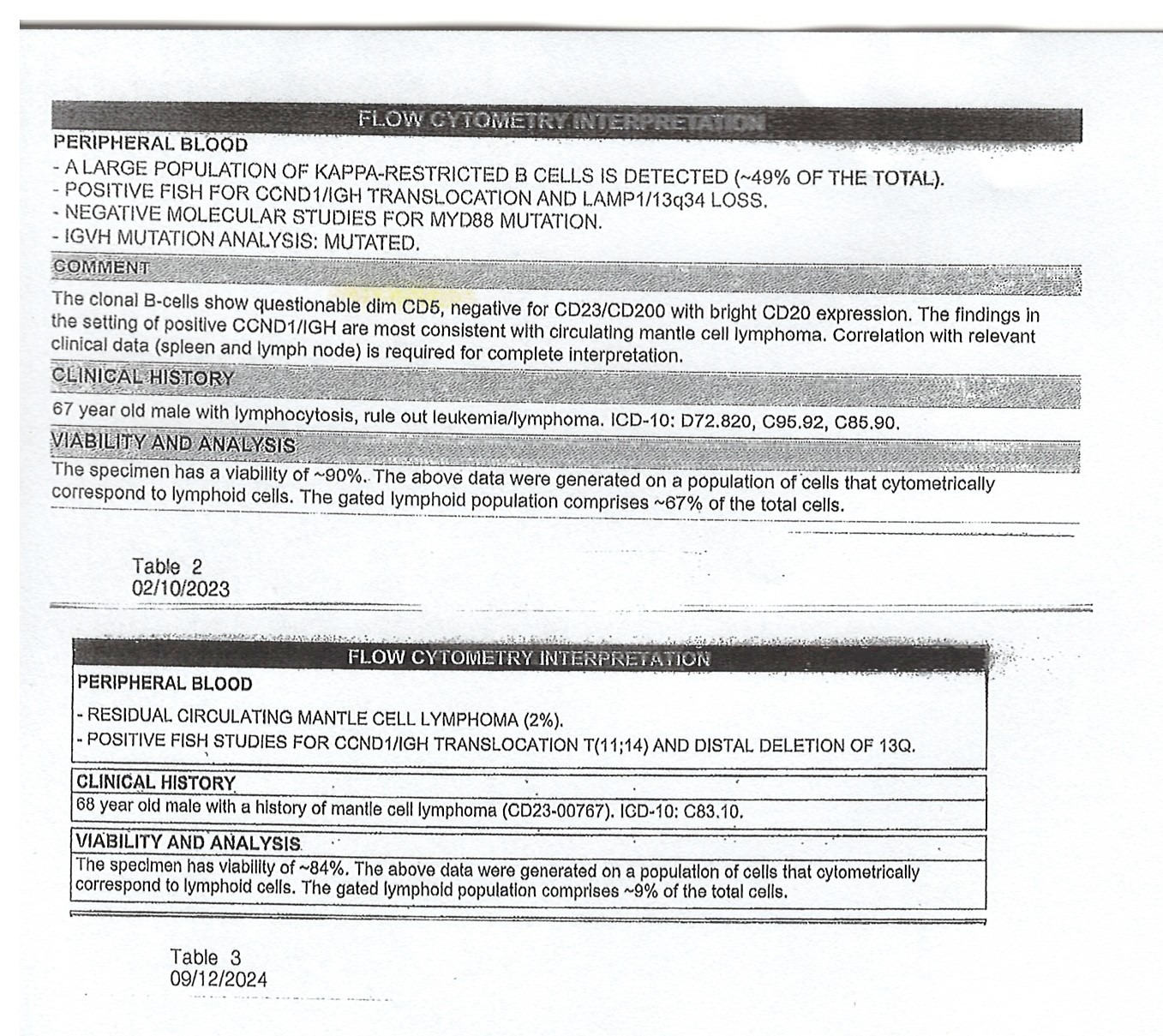Sunday Poster Session
Category: IBD
P1257 - Etrasimod Therapy in Ulcerative Colitis: An Unexpected Hematologic Finding in a Patient With Leukemic Mantle Cell Lymphoma
Sunday, October 26, 2025
3:30 PM - 7:00 PM PDT
Location: Exhibit Hall
- LG
Larry Good, MD, FACG
Mount Sinai South Nassau
Lynbrook, NY
Presenting Author(s)
Larry Good, MD, FACG1, Joseph Ramek, MD2
1Mount Sinai South Nassau, Lynbrook, NY; 2Optum Hematology Oncology, Lake Success, NY
Introduction: Sphingosine-1-phosphate receptors (S1PR) modulate lymphocyte trafficking and contribute to the inflammatory cascade in inflammatory bowel disease (IBD). S1PR modulators are widely distributed in immune processing cells in the GI tract and their efficacy is based on reducing the accumulation of lymphocytes in diseased bowel and enhances the integrity of the intestinal mucosal barrier.1,2,3
Case Description/
Methods: Male 69 with a history of UC since 2009 had been treated with mesalamine until he experienced a flare in 8/2024 with diarrhea, urgency, rectal bleeding, elevated fecal calprotectin and Mayo Grade II activity on colonoscopy. He was then started on etrasimod, mesalamine was discontinued and clinical remission was achieved. He has several comorbidities including dyslipidemia, coronary artery disease with stents, metabolic syndrome and recurrent DVT treated with Xarelto. 3/2023, he was diagnosed with low grade LMCL which has been under close observation but not treated. Etrasimod therapy resulted in a dramatic reduction of his WBC count and his lymphocytosis.
Table 1
He had a dramatic improvement in his flow cytometry studies from 2/10/2023 to 9/12/2024.
Table 2
Table 3
In this report, chronic UC anteceded the diagnosis of LMCL by 14 years. The introduction of etrasimod therapy was noted to improve the differential WBC count and the DNA flow cytometry after 6 weeks of etrasimod therapy. The patient's UC remains in remission at this time.S1P and S1PR1 are often upregulated in LMCL cells. S1P modulators are currently FDA approved to treat UC and MS and can be considered candidate drugs to treat LMCL and should be studied for the purpose.
Discussion: S1P and S1PR play a role in LMCL development and sphingosine kinase 1 (SK1) upregulation is associated with increased S1P levels in LMCL cells. S1P signaling can promote tumor angiogenesis and cell survival promoting MCL growth. Conversely, blockade of the specific S1P receptor, S1PR1 can inhibit S1P signaling and potentially reduce tumor growth.4 Blockade of S1P1 signaling can lead to natural killer T cell activation leading to effective anti-tumor effect.5,6 The concurrence of MCL and UC and CD is uncommon but has been reported in the literature.7 Both chronic inflammation and chronic immunosuppression are known to increase the risk of lymphoma. Awareness of the mechanism of action of this class of drugs should stimulate future research for new applications of these important biologically active molecules.8

Figure: TABLE 1

Figure: Table 2 & 3
Disclosures:
Larry Good indicated no relevant financial relationships.
Joseph Ramek indicated no relevant financial relationships.
Larry Good, MD, FACG1, Joseph Ramek, MD2. P1257 - Etrasimod Therapy in Ulcerative Colitis: An Unexpected Hematologic Finding in a Patient With Leukemic Mantle Cell Lymphoma, ACG 2025 Annual Scientific Meeting Abstracts. Phoenix, AZ: American College of Gastroenterology.
1Mount Sinai South Nassau, Lynbrook, NY; 2Optum Hematology Oncology, Lake Success, NY
Introduction: Sphingosine-1-phosphate receptors (S1PR) modulate lymphocyte trafficking and contribute to the inflammatory cascade in inflammatory bowel disease (IBD). S1PR modulators are widely distributed in immune processing cells in the GI tract and their efficacy is based on reducing the accumulation of lymphocytes in diseased bowel and enhances the integrity of the intestinal mucosal barrier.1,2,3
Case Description/
Methods: Male 69 with a history of UC since 2009 had been treated with mesalamine until he experienced a flare in 8/2024 with diarrhea, urgency, rectal bleeding, elevated fecal calprotectin and Mayo Grade II activity on colonoscopy. He was then started on etrasimod, mesalamine was discontinued and clinical remission was achieved. He has several comorbidities including dyslipidemia, coronary artery disease with stents, metabolic syndrome and recurrent DVT treated with Xarelto. 3/2023, he was diagnosed with low grade LMCL which has been under close observation but not treated. Etrasimod therapy resulted in a dramatic reduction of his WBC count and his lymphocytosis.
Table 1
He had a dramatic improvement in his flow cytometry studies from 2/10/2023 to 9/12/2024.
Table 2
Table 3
In this report, chronic UC anteceded the diagnosis of LMCL by 14 years. The introduction of etrasimod therapy was noted to improve the differential WBC count and the DNA flow cytometry after 6 weeks of etrasimod therapy. The patient's UC remains in remission at this time.S1P and S1PR1 are often upregulated in LMCL cells. S1P modulators are currently FDA approved to treat UC and MS and can be considered candidate drugs to treat LMCL and should be studied for the purpose.
Discussion: S1P and S1PR play a role in LMCL development and sphingosine kinase 1 (SK1) upregulation is associated with increased S1P levels in LMCL cells. S1P signaling can promote tumor angiogenesis and cell survival promoting MCL growth. Conversely, blockade of the specific S1P receptor, S1PR1 can inhibit S1P signaling and potentially reduce tumor growth.4 Blockade of S1P1 signaling can lead to natural killer T cell activation leading to effective anti-tumor effect.5,6 The concurrence of MCL and UC and CD is uncommon but has been reported in the literature.7 Both chronic inflammation and chronic immunosuppression are known to increase the risk of lymphoma. Awareness of the mechanism of action of this class of drugs should stimulate future research for new applications of these important biologically active molecules.8

Figure: TABLE 1

Figure: Table 2 & 3
Disclosures:
Larry Good indicated no relevant financial relationships.
Joseph Ramek indicated no relevant financial relationships.
Larry Good, MD, FACG1, Joseph Ramek, MD2. P1257 - Etrasimod Therapy in Ulcerative Colitis: An Unexpected Hematologic Finding in a Patient With Leukemic Mantle Cell Lymphoma, ACG 2025 Annual Scientific Meeting Abstracts. Phoenix, AZ: American College of Gastroenterology.
